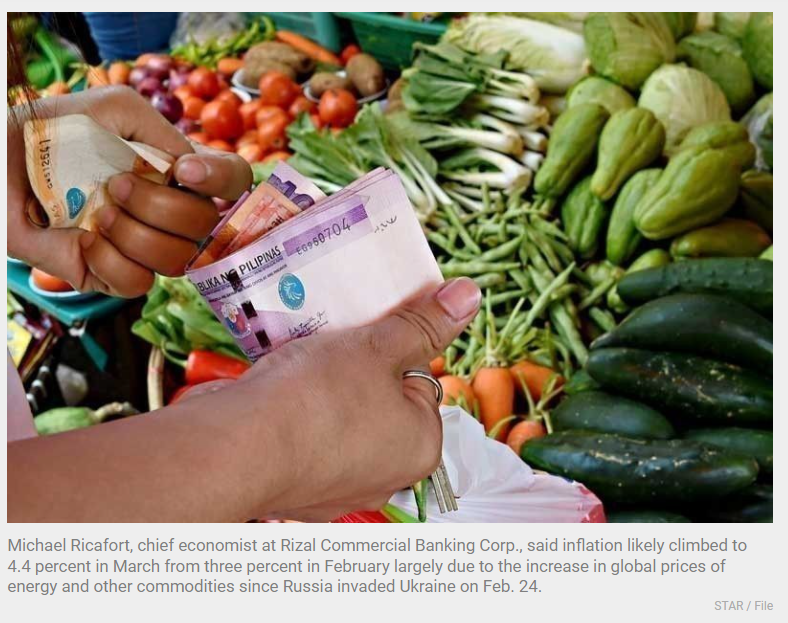Philippines: Economists see higher inflation in March
MANILA, Philippines — Inflation likely accelerated in March and breached the upper end of the two to four percent target set by the Bangko Sentral ng Pilipinas (BSP), according to economists.
Michael Ricafort, chief economist at Rizal Commercial Banking Corp., said inflation likely climbed to 4.4 percent in March from three percent in February largely due to the increase in global prices of energy and other commodities since Russia invaded Ukraine on Feb. 24.
Ricafort said the consumer price index (CPI) likely picked up to four percent range for the coming months due to the relatively weaker peso exchange rate versus the dollar.
“For the coming months, potential sources of second-round inflation effects would be monitored, such as the petitions on transport fare hikes and proposed wage increase, both of which could result in higher prices of other affected goods and services in the economy, as these would be considerations for any decision on local policy rates,” Ricafort said.
He also cited the expected faster and earlier rate hikes by the US Federal Reserve in the coming months to better manage inflation and inflation expectations, as well as maintain health interest rate differentials.
Ricafort said non-monetary measures, such as increased subsidies for the transport and agriculture sectors, would mitigate the inflationary impact of the higher local fuel pump prices.
ING Bank Manila senior economist Nicholas Mapa said inflation likely rose to four percent in March, with upward pressures emanating from private vehicle transport costs on top of utilities.
Mapa said select food items delivered downside pressures.
“We cannot rule out the emergence of demand-side pressures as the economy, as described by the BSP, has turned the corner and is on the mend. This suggests that demand has returned, albeit not quite at pre-pandemic levels just yet,” he said.
ING Bank sees inflation peaking at five percent by May amid the pickup in consumption.
“We expect inflation to accelerate past the upper end of the inflation target as commodity prices edge higher with elevated prices on the ground likely to persist throughout the year,” Mapa said.
Jun Neri, lead economist at Bank of the Philippine Islands, said inflation may have accelerated to 3.9 percent in March from three percent in February, as several upward forces are already under way, resulting in another target breach for the second year.
Neri said the Monetary Board could choose to continue falling behind the curve in its next meeting, but cautioned that with the unintended side effects like mispricing of risk, credibility, and consistency with policy mandate, de-anchoring of inflationary expectations may be difficult to reverse.
“These side effects may already be slowing the pace of our much needed recovery, as allocation of the financial system resources have likely favored less productive sectors instead of the more productive ones like start ups and future proofed businesses,” Neri said.
Security Bank chief economist Robert Dan Roces said inflation likely settled at 3.8 percent in March, with a range of 3.6 to four percent.
“In terms of proportion, inflation contributions reflect the effect of oil and other commodities’ price spikes on the back of the Russia-Ukraine conflict and resulting sanctions,” Roces said.
Looking ahead, Roces said inflation risks remain tilted on the upside due to cost-push but also with some demand-driven growth.
Roces said the release by the US of an extra million barrels of crude a day from its reserves to tame prices may bode well for global inflation and eventually for the Philippines.
Alvin Arogo, economist at Philippine National Bank, also believes that inflation accelerated significantly to 3.8 percent in March due to the jump in oil prices together with the prices of commodity prices.
“Unless inflation spirals out of control starting March, we believe the central bank will not change the reverse repurchase rate until May due to the elections,” Arogo said as PNB forecasts two rate hikes of 25 basis points in June and another 25 basis points in September.
For his part, UnionBank chief economist Ruben Carlo Asuncion said inflation likely picked up to 3.5 percent as transport CPI surged amid the rise in global oil prices.
“Some Filipinos are still willing to go out and about despite the exorbitant rise in fuel costs of the past month. Thus, the impact on consumption, at this point, may be minimal, but we still expect inflation to come back with a vengeance in the coming months especially if the Ukraine-Russia crisis will continue to drag on,” Asuncion said.
The BSP sees inflation accelerating to a range of 3.3 to 4.1 percent in March from three percent in February.
In its assessment last March 24, the Monetary Board raised its inflation forecasts to 4.3 percent from the original target of 3.7 percent for this year and to 3.6 instead of 3.3 percent for next year.
Source: https://www.philstar.com/business/2022/04/04/2171991/economists-see-higher-inflation-march


 English
English




